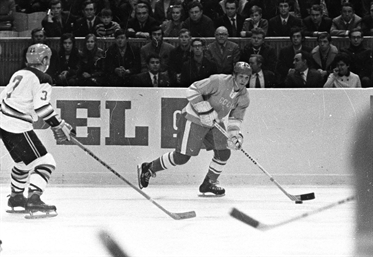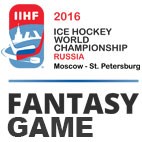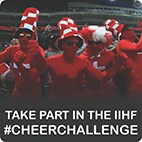100 goals in 10 games
100 goals in 10 games
A look back at Worlds on Russian soil: 1973

 Soviet forward Alexander Maltsev skates with the puck at the Luzhniki Sports Palace in Moscow during the 1973 IIHF Ice Hockey World Championship with West Germany’s Josef Volk watching. Photo: Archive Vladimir Nabokov
Soviet forward Alexander Maltsev skates with the puck at the Luzhniki Sports Palace in Moscow during the 1973 IIHF Ice Hockey World Championship with West Germany’s Josef Volk watching. Photo: Archive Vladimir Nabokov
That was the first Championship after the historic Canada-USSR Summit Series held in 1972. Those eight games radically changed the established views on how the game of ice hockey should be played, and now the fans in the Luzhniki Sports Palace in Moscow, a multi-purpose facility, were eagerly looking forward to a new shape the game had taken on. The teams lived up to the expectations playing tougher, more aggressive hockey and, consequently, scoring more goals.
Defending world champions Czechoslovakia claimed their ambitious aspirations from the outset crushing Poland, a newcomer at this level, 14-1. The Soviets too showed they were no less serious about their intentions destroying West Germany in the opening tilt 17-1. Hockey experts and fans now could see the three clear contenders for the title: USSR, Czechoslovakia and Sweden.
Everybody’s interest centred round one question: Would there be a single team able to beat the Soviet hosts in at least one game? Really, the hosts had it tough in the first-round game against Czechoslovakia. Both teams had great players on their rosters – Jiri Holecek, Frantisek Pospisil brothers Jaroslav and Jiri Holik, Vaclav Nedomanski, Vladimir Martinec starred for Czechoslovakia, and Vladislav Tretiak, Valeri Vasiliev, Vladimir Lutchenko, Valeri Kharlamov, Boris Mikhailov, Alexander Yakushev, Alexander Maltsev for the Soviets. The hard-fought game ended in a 3-2 win in favour of the USSR.
However, the tournament situation was entangled after Sweden beat the Czechoslovaks 2-0, though afterward the Soviets took the better of Sweden, 6-1, jumping into a comfortable tournament lead.
In the second round game against West Germany, the Spartak Moscow line of Alexander Martynyuk - Vladimir Shadrin - Alexander Yakushev turned in a brilliant performance, as toward the end of the second period Martynyuk alone scored eight goal. After that the coach didn’t send him back onto the ice. Afterward, some people were speculating that ambitious Bobrov did not want Martynyuk to topple his own single-game scoring record.
The crucial match for the USSR turned to be against Czechoslovakia. In case of the Soviets’ win, they would become World Champions ahead of time. The Czechoslovak players have always been an unyielding side whenever they were to take on the Soviets, regardless where the game was played. However, this time they lost to the home team USSR 4-2.
The championship’s last game against Sweden was of special importance to USSR coach Vsevolod Bobrov because in the first-ever World Championship in Moscow, in 1957, Tre Kronor tied the Soviets to win the title. Bobrov missed the action due to an injury but took that slip-away home-ice championship much to his heart.
Happily for him the game’s outcome could not affect final standing this time as the Soviets took the ice as designated world champion. However, beating Sweden this time around was the matter of principle, and he demanded his team to go all out. Emotions flew high boiling down to star forward Valeri Kharlamov drawing a ten-minute misconduct penalty. Soviet assistant coach Boris Kulagin promised the player who scored the 100th Soviet goal at the tournament a special award. Toward the end of the third stanza captain Boris Mikhailov did score. He received a vintage Armenian brandy after the tournament ended.
But the last goal of the championship was scored by Sweden’s star defenceman Borje Salming with five seconds remaining in regulation time to establish the final score of 6-4 in favour of the USSR.
For Mikhailov that World Championship was his first as captain. In addition, he proved his leadership abilities by winning an individual award. Holecek was named best goaltender, Vasiliev best defenceman and Mikhailov best forward. The tournament All-Star Team determined by the media included Holecek as the goaltender, Alexander Gusev and Borje Salming as defencemen and the CSKA forward line of Kharlamov-Petrov-Mikhailov on offence, with Vladimir Petrov winning the best scorer laurels with 18 goals and 16 assists thus combining for 34 points total.
Russian fans were eager to see hockey at its best again in Moscow and they were not disappointed with the games and results.
Back to Overview














































































